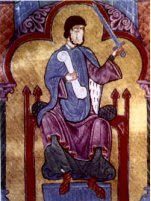Raymond of Burgundy
| Raymond of Burgundy | |
|---|---|
| Count of Galicia | |

Raymond in a miniature of the Tumbo A cartulary in the cathedral of Santiago de Compostela, the chief bishopric of his dominion.
|
|
| Count of Portugal | |
| Reign | 1093–1096 |
| Predecessor | Nuno Mendes |
| Successor | Henry |
| Born | 1070 Besançon, County of Burgundy |
| Died | 24 May 1107 Grajal de Campos |
| Burial | Cathedral of Santiago de Compostela |
| Spouse | Urraca of León and Castile |
| Issue |
Sancha Raimúndez Alfonso VII of León and Castile |
| House | Ivrea |
| Father | William I, Count of Burgundy |
| Mother | Stephanie |
| Religion | Roman Catholicism |
| Signature |  |
Raymond of Burgundy (c. 1070 – 24 May 1107) was the ruler of Galicia from about 1090 until his death. He was the fourth son of Count William I of Burgundy and Stephanie. He married Urraca, future queen of León, and was the father of the future emperor Alfonso VII.
When Raymond and his cousin, Henry of Burgundy, first arrived in Spain is uncertain, but it probably it was with the army of Duke Odo I of Burgundy in 1086, to prosecute the Reconquista against the Muslims. In April 1087, the army abandoned its siege of Tudela and most of the host returned home, but Odo and his retinue went west. By 21 July 1087 they were probably at Burgos, at the court of Alfonso VI, and by 5 August he was in the capital city of León. There Odo arranged Raymond's marriage to Alfonso's heiress, Urraca. All surviving charters which seem to place Raymond in Spain before 1087 are either misdated or interpolated.
By his marriage Raymond received as dowry the government of the Kingdom of Galicia (which included the County of Portugal and the County of Coimbra), although shortly after, in 1095, Alfonso VI gave the County of Portugal and the County of Coimbra to Henry of Burgundy, father of the first Portuguese King Afonso Henriques of Portugal, basing it in Bracara Augusta (nowadays Braga). During his government he was titled Count, Dominus, Prince, Emperor and Consul of Galicia or of the Galicians, exercising near absolute power in his domains ("in urbe Gallecia regnante Comite Raymundus"): "serenissimus totius Gallecie comes", "totius Gallecie Senior et Dominus", "totius Gallecie Consul", "totius Gallecie Princeps", "totius Gallecie Imperator".
...
Wikipedia
